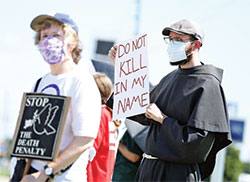Catholic inmate’s last words are Jesuit poem and prayer to Blessed Mother

Right, Conventual Franciscan Brother Ian Bremar holds a sign during an anti-death penalty protest in Terre Haute on July 17. (Submitted photo by Scott Langley)
By Natalie Hoefer
A little after 3 p.m. on July 17, Providence Sister Jan Craven reached out to a woman on the corner of a busy intersection in Terre Haute.
“I went up to her … and said, ‘There are no words,’ and I pointed to my heart. I told her we were praying with her and for her, and to take heart.
“She smiled and said, ‘I cannot thank you enough for what all of you are doing.’ ”
The woman was the daughter of federal death-row inmate Dustin Lee Honken.
The moment that led to their encounter was an anti-death penalty protest prior to the scheduled 4 p.m. execution of her father by lethal injection at the Federal Correctional Complex just a mile away.
She was not present for the silent prayer vigil at 4 p.m. that followed the protest.
Nor was she there to hear a hammer strike a standing bell at 4:40 p.m., solemnly ending the vigil four minutes after her father was pronounced dead.
“God is the author of life, and our hands are in God’s hands only,” Conventual Franciscan Brother Ian Bremar said to the group after the bell’s tone ceased. “It’s not for us to force death upon others.”
During the protest, the pastoral associate for university ministry at
St. Joseph University Parish in
Terre Haute held a sign reading, “Do not kill in my name.”
He was joined at the protest and prayer vigil by Providence Sister Jeanne Hagelskamp.
“It was painful, truly painful,” she said of her feelings during the gathering. “I found myself asking how we as a nation can think it is right to kill someone for killing someone. What makes their killing wrong and ours right?”
‘Conversion as a lifelong process’
Honken was convicted of killing three adults and two children in Iowa in 1993.
In the last few weeks, numerous news outlets mentioned Honken’s conversion to Catholicism while in prison.
“Keeping in mind the fate of the so-called good thief traditionally known as Dismas, hanging on the cross next to Jesus, the Church has long held the belief in conversion as a lifelong process that remains a possibility for each and every person until the final moment of death,” said Archbishop Charles C. Thompson in a recent statement.
On July 9, Cardinal Joseph W. Tobin, Archbishop of Newark, N.J., sent a letter to President Donald J. Trump asking him to commute Honken’s sentence to life in prison without parole.
“I have known Mr. Honken for seven years,” wrote Cardinal Tobin, who, when serving as shepherd of the Archdiocese of Indianapolis, visited Honken and other death-row inmates at the federal penitentiary several times a year.
“His present spiritual guide, [Benedictine] Father Mark O’Keefe, confirms that the spiritual growth in faith and compassion, which I had witnessed in our meetings some years ago, continues to this day.”
Even Honken’s attorney Shawn Nolan mentioned Honken’s faith in a statement following the inmate’s death, noting he “worked every day at the Catholic faith that was at the center of his life.
“During his time in prison, he cared for everyone he came into contact with. … Over the years, he grew incredibly close to his family, becoming a true father, son, brother and friend.”
Honken’s conversion was attested to by his choice to read “Heaven-Haven,” a poem written by 19th-century poet Jesuit Father Gerald Manley Hawkins, in a final statement before his execution, according to a press release from Squire Patton Boggs, LLP.
His last words, according to the Des Moines Register, were, “Hail Mary, Mother of God, pray for me.”
The paper also reported that, in addition to a denied appeal to delay the execution due to the coronavirus, a last-minute effort by Honken’s lawyers to seek a stay of execution from the U.S. District Court for the District of Columbia was also denied, allowing his execution to continue as planned.
Purkey executed despite Alzheimer’s
Such was not the case for federal death-row inmates Daniel Lewis Lee and Wesley Ira Purkey, who had been scheduled for execution on July 13 and 15, respectively.
A volley of last-minute litigation in each case led to 2:30 a.m. next-day decisions by the United States Supreme Court to overturn seperate temporary stays of execution. Each man was put to death a few hours after their particular appeal was overturned, Lee on July 14 and Purkey on July 16.
Anti-execution activist St. Joseph Sister Helen Prejean released a statement on July 16 through her organization, Ministry Against the Death Penalty, calling on the U.S. Congress to launch an investigation into alleged misconduct surrounding the execution of Purkey, who had Alzheimer’s disease at the time of his execution.
‘We say we’re civilized … ’
Shortly before 4 p.m. on July 17, Providence Sister Paula Damiano helped call to prayer those gathered at the noisy Terre Haute intersection.
She mentioned hearing a person from a passing car call out, “An eye for an eye!” (Mt 5:38).
“But that is only half of the [message],” she noted. “It goes on to say, ‘But I say to you, love your enemies and pray for those who persecute you’ (Mt 5:44).
“We can’t forget that part of it, … that justice, love and mercy is the answer. …
“We say we’re a civilized country. Are we? Are we really?”
(Editor’s note: Natalie Hoefer
witnessed the protest and prayer vigil
via livestream, made available by DeathPenaltyAction.org.) †
